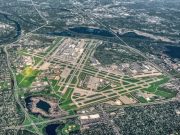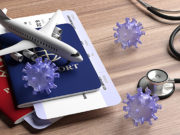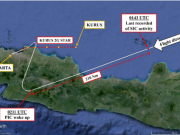The aviation community “can’t let our guard down on safety,” despite the attention being devoted to fighting the COVID-19 pandemic, Steve Dickson, administrator of the U.S. Federal Aviation Administration (FAA), told a Flight Safety Foundation webinar today.
Dickson said the FAA has developed a range of plans and back-up plans aimed at limiting FAA employees’ exposure to the coronavirus, providing regulatory rulings and keeping the National Airspace System running safely. Another item on the agency’s agenda is the continuing work on recertification of the Boeing 737 MAX.
Dickson made the remarks as the opening keynote speaker at the Foundation’s Virtual BASS 2020 Webinar, being held today and Thursday in place of the long-planned annual Business Aviation Safety Summit (BASS), and presented in partnership with the National Business Aviation Association.
Dickson noted the dramatic decline in air traffic since the virus took hold, with about a 70 percent drop by mid-April in the number of airplanes flying and a 90 to 95 percent drop in the Transportation Security Administration’s passenger count. The downturn for business aviation is at similar levels, he said.
For example, he said, New York City’s airports normally are no. 1 in passenger volume, but the decline has left them in 11th place. LaGuardia Airport, which typically averages 1,100 flight operations a day, recorded 57 on Tuesday, he said.
He added that the FAA is planning webinars and other activities to help ease the return to normal activity. “As aviation rises again, and it will, we have to be ready,” he said.
Dana Schulze, director of the NTSB Office of Aviation Safety, told the webinar that the pandemic has forced changes in some of the agency’s methods of accident investigation, as the agency weighs the benefits of on-site accident investigation against health risks and logistical problems that might face investigators.
“We’re working to get as much done as we can with a desk-investigation approach,” she said, noting that, because of the pandemic, 16 accidents that normally would have been investigated by personnel at the site are instead being handled remotely.
The webinar included presentation of the FSF Business Aviation Meritorious Service Award to James Albright, author of the Flight Lessons books and a founder of the code7700.com website, which says it is “designed for pilots wishing to avoid having to squawk [emergency code] 7700 and to help them for when that day comes.”
In the afternoon session, Thomas Anthony, director of the University of California Aviation Safety and Security Program, described the pandemic as “the most significant threat to aviation that we have encountered in our lifetimes.”
Lisa Sasse, chairman of the board of FlightStart Solutions and chair of the Flight Safety Foundation Business Advisory Committee, said that, in the beginning, complacency will be the greatest threat to the return to normal operations.
Two other presenters discussed crew fatigue, with Rajni Walia, Ph.D., vice president of DEKRA North America, saying that during the pandemic, an individual’s most effective methods of controlling fatigue include controlling his or her stress level as much as possible.
Gary Toups, the Mayo Clinic’s senior aviation medical examiner, discussed aids to sleep and alertness, noting that, when used properly, caffeine can boost alertness during key phases of flight. For example, a cup of coffee consumed before beginning a descent, can help a pilot be more alert during landing 15 to 30 minutes later, he said.
The next webinar session begins at 9:30 a.m. EDT (1330 UTC) Thursday.


